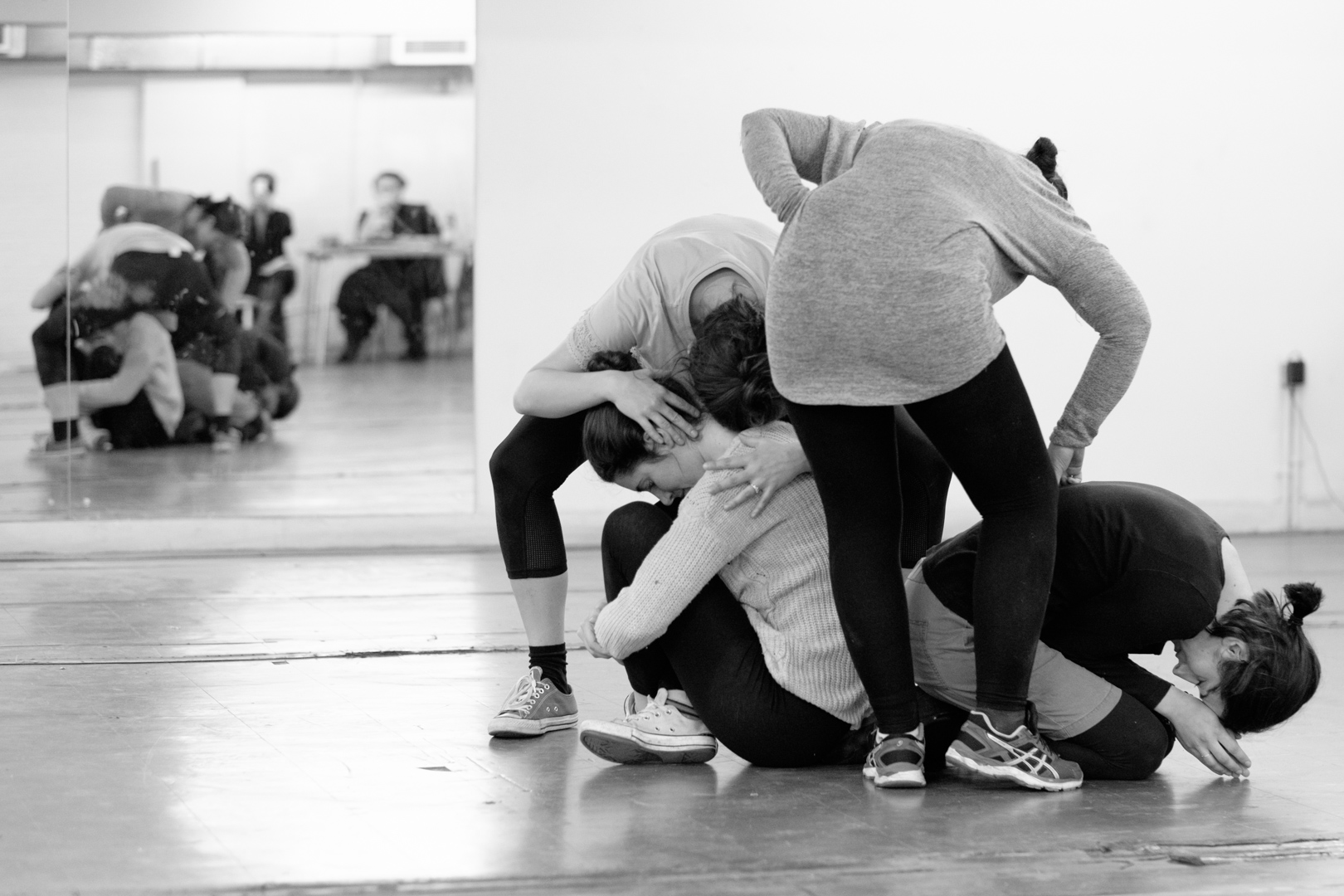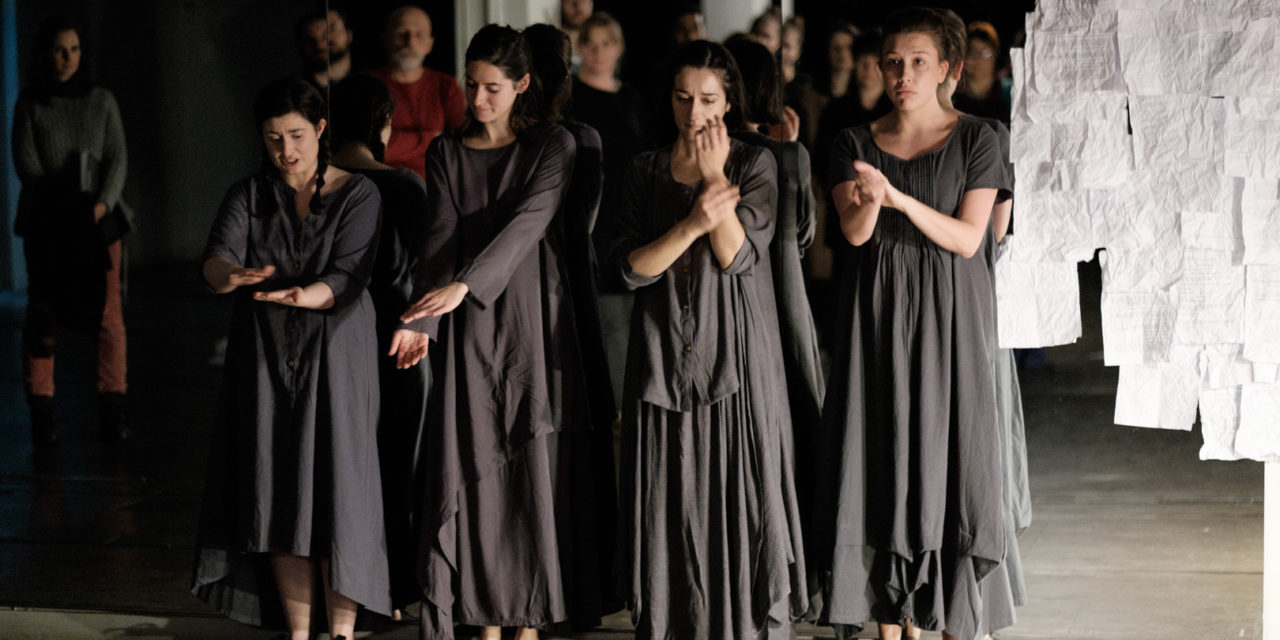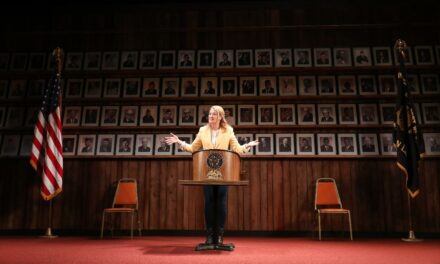In November 2017, a world premiere by one of the Hungarian language’s leading playwrights was staged in a subterranean, site-specific production in London’s eastern borough of Hackney. The play’s translator Jozefina Komporaly describes how this tale, based on the life of a woman born in Skopje, found its way to London via Hungarian, Romania, English, and one international theatre company’s pioneering theatre translation programme.
[Foreign Affairs] theatre company was set up in 2010 by artistic directors Camila França and Trine Garrett with the express aim of championing dramatic traditions other than that of the Anglophone world. As an international organization based in East London, [Foreign Affairs] puts on productions in English, and its creative process situates translation at the core of the page to stage transfer. To date the company has produced both contemporary work–that could be classed as new writing for the stage–and classics–in other words, plays relatively well-known in the Western canon, and in both instances commissioned fresh translations that resonate with the here and now and with the artists’ unique vision for the given text. This approach to translation, as a pathway for accessing culturally distant or different works via their immediate relevance to the present and to our contemporary concerns is a key facet of [Foreign Affairs’] raison d’être, and is manifest in all of the company’s productions to date, from brand new translations of Schnitzler’s Professor Bernhardi and Ibsen’s A Doll’s House to recent discoveries in terms of global playwriting.
A culmination of this interest has been recently represented by the company’s ground-breaking initiative to reach out to emerging stage translators, working out of potentially any language into English, and by way of offering a mentorship scheme, to encourage and actively develop their practical translation skills. Launched in the summer of 2016, the [Foreign Affairs] Translates! Programme invites potential participants to champion a play they would like to translate, and following a selection process, then mentors three chosen translators in a given season. During the six months period of the mentorship, translators spend regular time with the company and workshop their translations-in-progress both with a team of expert translators affiliated to the company and professional actors and theatre-makers, thus being given the opportunity to test out their ideas and solutions for various actual situations. As a rule of thumb, such a nurturing environment and such conditions for experimenting with multiple potential solutions are extremely rare in a British theatre context, and even when translators are commissioned by theatres they tend to follow tight deadlines, directors expecting a finished product that may or may not get to be significantly revised in the rehearsal process. Equally, translators may or may not be involved or consulted at this stage of the process, and even when they are present in rehearsal rooms, time constraints and/or directorial agendas may not allow for major reconfigurations.
I was fortunate to be selected as one of the participants in the inaugural [Foreign Affairs] Translates! Project in 2016, together with fellow translators Siân Mackie and Valentina Marconi. Between the three of us we covered various geographical extremities (albeit in Europe), and negotiated the passage of Swedish, Hungarian, Croatian, Italian, and German language extracts into English, at times within the confines of a single play. As a further testimony to [Foreign Affairs’] uncompromising approach, two of us broke one of the generally uncontested rules in translation circles and actually translate out of our mother tongues into a language that we have made our own through education and cultural affiliation, and all three of us were women coming from various educational and professional backgrounds in which day-to-day theatre translation praxis is but one component.
Our chosen plays, initially transposed into English in relatively typical “translator conditions:” i.e. sitting alone at our desks trying to meet a deadline, would gradually come to life in the course of the programme, taking shape via regular drafts, revised time and time again as a result of conversations with our translator mentors Paul Russell Garrett, Roland Glasser and William Gregory, and ongoing practical experimentation facilitated by members of the broader [Foreign Affairs] collective, including the artistic directors, a group of amazingly hands-on actors, and vocal and rhythm support from Franck Jeuffroy and Krzysia Balińska. So, by the end of the six months residency, the first [Foreign Affairs] Translates! Showcase, held at the Above the Arts Theatre in London’s West End December 9-10, 2016, was able to offer a sophisticated juxtaposition of extracts from three very different yet in many ways interconnected dramatic texts. In this way, August Strindberg’s darkly humorous symbolist play To Damascus (translated by Siân Mackie) was a natural introduction to Ivana Šojat’s epic multilingual Central European saga Unterstadt (dramatized by Zlatko Sviben and translated by Valentina Marconi), which in turn comfortably led the way to Transylvanian author András Visky’s lyrical and polyphonic play, The Unburied: The Saint Of Darkness by myself.
In short, the [Foreign Affairs] Translates! programme has offered an intensive journey, by way of practical experimentation, from initial translation idea to polished text in English, also facilitating in parallel public awareness in the UK translation and theatre community regarding new voices in international playwriting as well as emerging translation talent. The company’s sell-out headline workshop at the 2017 International Translation Day at the British Library is such a case in point, in addition to being a testimony to its growing public profile and prestige. To date, [Foreign Affairs] has collaborated with several international organizations and cultural centers, and was the recipient of an Arts Council of England award for their production of András Visky’s The Unburied: The Saint Of Darkness. This production was also generously supported by the Romanian Cultural Institute in London (RCI), an organization with a reputation for nurturing transcultural contributions to the international arts and theatre scene. Among their many projects, the RCI had previously endorsed the work of playwright András Visky and translator Jozefina Komporaly, most recently by hosting a platform at the Waterstones Bookshop in Piccadilly as part of the London Book Fair in March 2017 to mark the publication of Komporaly’s edited anthology András Visky’s Barrack Dramaturgy: Memories Of The Body.
Moving from an extract developed for the [Foreign Affairs] Translates! 2016 Showcase to full production in November 2017 was a first for the company and offered an ideal opportunity to demonstrate the crucial importance and viability of nurturing translation skills within the climate of professional theatre practice. It was also an ideal trajectory for an emerging stage translator and a playwright relatively unknown in the English-speaking world, despite being a multi-award-winning author in his native Romania and in neighboring Hungary, the cultural and linguistic heritage of which he shares. The (by now) long-term working relationship with the company, has allowed for a gradual process in terms of generating an English-language play text: as loyal as possible to the source but also attuned to such key concerns as speakability and performability within the context of the contemporary British stage, not to mention matters of interpretation and directorial vision. The original play (Temetetlenek: A Sötétség Szentje in Hungarian) uses a plethora of high register words which are characteristic for the playwright’s style and are widely used in Hungarian literature without necessarily making a point about class demarcations. In English, however, the presence of Latinate words tend to conjure up connotations of elitism, in addition to often being multi-syllabic and hence requiring longer stage time which can influence rhythm, especially in the case of a deeply poetic text. On reflection, and with a view to bringing this play as close to contemporary English-speaking audiences as possible, we decided to opt for a lower register and favour synonyms used in everyday speech, thus replacing moribund with “dying,” divulge with “give away” or emanate with “pour out.”

In rehearsals for The Unburied. Photo (c) Luca Migliore
Despite such conundrums, Visky’s play is achingly contemporary: it was written in 2016 and originally intended for the radio, though its polyphonic qualities and visual richness instantly invite ideas for mise-en-scène in live theatre conditions. The Unburied: The Saint Of Darkness is at the same time a chamber piece, a family drama, and instance of post-dramatic theatre and a strong political and philosophical play, as it reflects on the current international migration crisis through a strong central protagonist, the figure of Mother Teresa of Kolkata. It draws on aspects of Mother Teresa’s biography and even integrates elements of her journals, yet it is not a play solely about a particular individual in particular situations but a metaphor for universally valid human concerns. Being “other” in a hostile environment is a recurrent trope in the play, and so is the question of belief and doubt and the subtle negotiation between the two. Love and temptation in their manifold manifestations also underpin the play, therefore one of our concerns when workshopping the text was to ponder about questions of identity and try to figure out who this Mother Teresa figure might be for us, right here and right now. Visky creates a fluid sense of temporality, juxtaposing images of Teresa at various ages and stages of her life, in this way overlapping past, present, and future, and arguing for a quasi-mythical and cyclical sense of time that cannot be taken too literally yet that also resonates with the here and now. Thus, for instance, for the initial 2016 extract, I felt that in order to situate this play alongside the other two plays in the showcase and also to do justice to the character’s nuanced polyphonic qualities, more than one language was necessary, so after meticulously translating Visky’s words into English I “smuggled back” snippets of the original Hungarian to suggest this sense of otherness and dislocation that underpins the play. For the full production in 2017, however, the various selves of Teresa were embodied by four different performers, themselves coming from various cultural backgrounds, therefore I felt that it was superfluous to introduce a literal layer of “foreignness” as a multitude of accents were already present in the production. Irene Panni, Isobel Pilkington, Megan Smith, and Olivia Negrean were all equally strong and valid facets of Teresa, just as audience members, too found themselves “cast” as Teresas of sorts in their soul-searching, hesitation, doubts, and endeavours to make sense of the world.
I can claim on good authority that [Foreign Affairs] is adamant to accompany those who are willing to participate in this journey, symbolically sharing in Teresa’s sense of responsibility, duty and mission to highlight, with a dose of humour, the fact that we live in a topsy-turvy world that nevertheless is a treasure trove of cultural adventures. The company’s forthcoming proposition is [Foreign Affairs] Translates! 2018 Showcase: Exploring China, Japan, and Finland, on January 19-20 2018 at the Rose Lipman Building in Hackney. Expect thought-provoking and innovative theatre that acknowledges no borders.
Dr. Jozefina Komporaly is a freelance translator, writing professional and academic with over fifteen years experience as a linguist, published author, and project manager. As an academic, she publishes on contemporary European and British drama and performance. She is the author of the monograph Staging Motherhood: British Women Playwrights, 1956 To The Present (Palgrave, 2006), and is currently working on the study Radical Revival As Adaptation: Theatre, Politics, Society (forthcoming from Palgrave). She is the editor of a critical anthology of plays by András Visky – Memories Of The Body: Captivity As A State Of Being In András Visky’s Barrack Dramaturgy – translated from the Hungarian and contracted by Intellect, forthcoming early 2017.
This post was written by the author in their personal capacity.The opinions expressed in this article are the author’s own and do not reflect the view of The Theatre Times, their staff or collaborators.
This post was written by Jozefina Komporaly.
The views expressed here belong to the author and do not necessarily reflect our views and opinions.


















